This Habits 2 Goals episode is FREE for ALL subscribers
Subscribe and be among the first to get your hands on the Unified Behavior Model™ white paper.
“Scientist (noun): a person who conducts systematic research to acquire and use knowledge—especially one skilled in the systematic observation of, and experiment with, phenomena in order to answer questions and test hypotheses.”
Today, we’re talking about what it means to be a scientist.
We revere scientists.
We admire their rigor.
We trust their data.
Why?
Because they test!
They measure.
They record, reflect, and refine.
Here’s the question (one more time)…
If you love science so much, where’s your behavioral data?
Where’s the record of your actions?
Where’s your feedback loop driving growth?
P.A.R.R.—The Habit Factor’s method for intentional habit development—parallels the scientific method precisely:
Plan: Form your hypothesis—your goal, your MSC, your “Target Days.”
Act: Execute the behavior as best you can on those Target Days.
Record: Log your successes and misses.
Reassess: Compare “Actuals” vs. “Targets.”
Behavior change—operative word—requires behavior change.
NOT “LOOPS”
Planning, Tracking, Recording, and Reassessing is how you’ll gather evidence that supports your commitment to developing new habits and achieving your goals.
It’s also how you’ll identify what works for you.
And, perhaps most importantly, how you reinforce your intention.
Plan – Act – Record – Reassess.
YOU ARE NOT A RODENT.
Today, we’re talking about scientists—not just the scientific method.
What does it mean to be a scientist?
Recently, a public figure was slammed for “not being a scientist.”
I won’t get into the politics—they don’t matter. The news was all over social media (X and Facebook in particular):
“She’s a kook. She’s no scientist!”
Those comments nudged me to look up the definition of scientist—here it is again:
“Scientist (noun): a person who conducts systematic research to acquire and use knowledge—especially one skilled in the systematic observation of, and experiment with, phenomena in order to answer questions and test hypotheses.”
To be clear, this is NOT a political post.
This is a gentle reminder that anyone who systematically observes, experiments, documents, and tests hypotheses is a scientist.
Being a scientist—for better or worse—is not about a degree; it’s about the act itself—the rigor of following a scientific method.
That’s precisely how P.A.R.R. arrived, by the way.
So, while the social‑media frenzy prompted this inquiry, it also reminded me of what’s almost certainly around the corner with the release of The Unified Behavior Model™ white paper.
“You’re no behavioral scientist!”
We’ll continue to let our work—a la P.A.R.R.—make that determination and speak for itself.
My concern isn’t about titles anyway; it’s about the work, its value, and its efficacy. I said it back in 2010: if The Habit Factor® helps just one person, it’ll be worthwhile.
Enter: The Unified Behavior Model™
Next stop: UBM, the Unified Behavior Model™—just twenty‑plus years in the making.
It’s set to do for behavioral science and behavioral literacy what The Habit Factor® did for intentional habit cultivation and the popularization of the habits‑to‑goals methodology—hopefully in far less time. Ha!
This is a very exciting moment. UBM will be the first elemental model to integrate the entire behavioral landscape with only a few requisite, elementary components.
Fortunately, the LLMs have had months to chew on it—the Unified Behavior Model™—learning it, critiquing it, and rigorously scrutinizing it.
The white paper is not yet available (expected release: mid‑June).
The good news is AI—via four LLMs (Grok, ChatGPT, Gemini, and Deepseek)—has already validated its innovations, contributions, and its place among existing models.
The moral of the story:
You don’t need a lab coat or letters after your name to be a scientist.
While behavioral science and popular habit books continue to glorify the “habit loop,” The Habit Factor® quietly championed P.A.R.R. as the intentional, human‑centered method aligned with the scientific method.
You don’t need permission to hypothesize, observe, experiment, record, and reassess.
God knows, if I’d waited for permission back in 2005 (“Who are you to write about habit?”), chances are good I’d still be waiting.
By following P.A.R.R., you run experiments on your habits and collect real‑world data.
In doing so, you are, in fact, a scientist.
Congratulations! Now get after it!
“The important thing is not to stop questioning. Curiosity has its own reason for existing.” ~ Albert Einstein
When it comes to human behavior, habits operate within a larger behavioral operating system—a Behavior Echo-System™. (Not ecosystem—echo as in reverberation.)
Your behavior is shaped by two powerful forces: your ENVIRONMENT and your THINKING—the stories you tell yourself.
This is why the other two books exist. 👇
This is why the Behavior Echo-System™—a pioneering model in its category—serves not only as a diagnostic tool but also as a prescriptive guide for fostering goal-directed behavior.
Keep on trackin’ ✅
~mg
📄 Grab the free habit tracking template: thehabitfactor.com/templates
Don’t Die with Your Music Still In You. » LAST CALL!
The Trilogy: WARNING: DO NOT READ THESE BOOKS!!!
The Habit Factor®: Daily wins for long-term goal momentum.
The Pressure Paradox™: Productivity, Performance & Peace of Mind.
EVERYTHING: The stories you tell yourself heavily influence your behavior.
» Some of you make H2G better and stronger!! Ha!
If you’re enjoying H2G, share and/or like— that simple act helps! 👊🏼 🙏🏼
Ready to level up? Click here to upgrade.
**What's your time worth? : Learn More Here! **
GOOD HABITS HAPPEN WHEN PLANNED;
BAD HABITS HAPPEN ON THEIR OWN.
🙌 That’s right! You can get The Habit Factor® FREE with your audible trial! https://audibletrial.com/habits2goals
New listeners, grab your free habits 2 goals tracking template here: https://thehabitfactor.com/templates
Podcast → Subscribe iTunes, Android
*Awarded: “Finalist: Self-help, Motivation”* International Book Awards: EVERYTHING is a F*cking STORY.
To learn more about P.A.R.R., just Google “P.A.R.R. and The Habit Factor.”


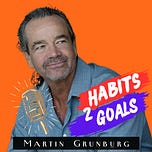


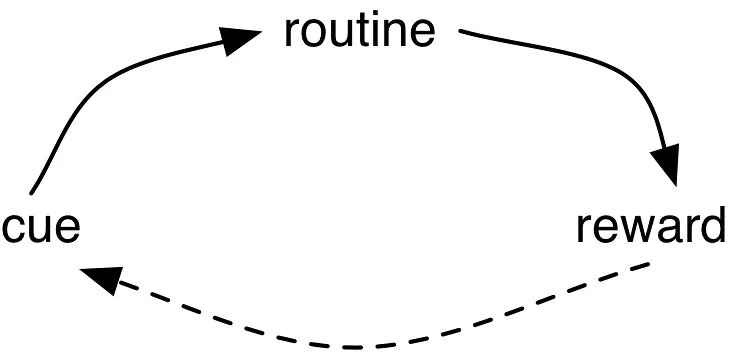




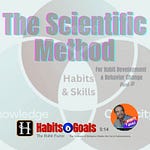
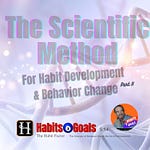
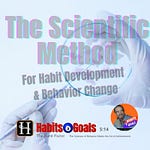


Share this post